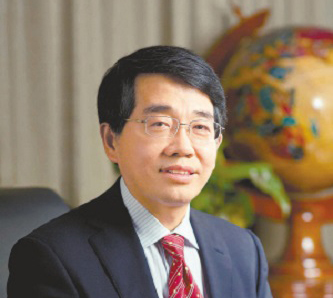President and Academician Huang Wei Was Successfully Elected Foreign Member of RAS
On the afternoon of October 28, 2016 at Moscow Time, Academician of Chinese Academy of Sciences, President of Nanjing Tech University, and Professor Huang Wei was successfully elected Foreign Member of Russian Academy of Sciences (RAS)for his academic achievement and international reputation as the pioneer of flexible electronics as well as expert in chemistry and material sciences.
The Russian Academy of Sciences (RAS), headquartered in Moscow, is considered a civil, self-governed, non-commercial organization chartered by the Government of Russia. The Emperor Peter the Great, inspired and advised by Gottfried Leibniz, founded the Academy in Saint Petersburg; the Senate decree of February 8 (January 28 old style), 1724 implemented the establishment. The RAS consists of the national academy of Russia; a network of scientific research institutes from across the Russian Federation; and additional scientific and social units such as libraries, publishing units, and hospitals. It was the deserved highest academic institutions inRussian Federation.
Since RAS owns the highest academic status in Russian Federation, the members of RAS enjoy supreme academic authority and social reputation. There are three types of membership in the RAS: full members (academicians), corresponding members, and foreign members. Academicians and corresponding members must be citizens of the Russian Federation when elected. Members of RAS are elected based on their scientific contributions - election to membership is considered very prestigious. Till now, 19 Nobel Prize Laureates affiliated with the RAS.
HUANG Wei:

Professor HUANG Wei is Academician of the Chinese Academy of Sciences, Foreign Member of Russian Academy of Sciences, President of Nanjing Tech University, and an eminent scientist in the area of organic optoelectronics and flexible electronics. He is Chair Professor of "The Recruitment Program of Global Talents" and the "Cheung Kong Scholars Program", Winner of the "National Outstanding Youth Fund", Chief Scientist of "The National 973 Programs", Honorary Doctor of the University of Sheffield, and Fellow of the Royal Society of Chemistry. Moreover, Professor Huang was awarded the Second Prize of the National Natural Science Award as the principal investigator for his work of 'The Design principles, effective fabrication of organic semiconductors and application for optoelectronic devices' in 2012, and the Technological and Scientific Progress Award from the Ho Leung Ho Lee Foundation, Hong Kong in 2014.
Born in May 1965, Academician Huang received his BSc in Chemistry from Peking University in 1983, then followed by receiving his MSc and PhD in Physical Chemistry from the same university. Then he did his postdoctoral research in the Department of Chemistry with the National University of Singapore (NUS) where he participated in the foundation of the Institute of Materials Research and Engineering (IMRE) since 1995.In 2001, he joined NUS again as a professor with the Faculty of Engineering, teaching polymer science. In 2001, he became Chair Professor at Fudan University, where he founded and chaired the Institute of Advanced Materials (IAM). In June 2006, he was appointed as the Deputy President of the Nanjing University of Posts and Telecommunications, where he initiated the Institute of Advanced Materials (IAM) and the Key Laboratory for Organic Electronics and Information Displays (KLOEID). In November 2011, he was elected as Academician of the Chinese Academy of Sciences (CAS). In July 2012, he was appointed as the President of the Nanjing Tech University (NanjingTech, 2011 University) and founded the Institute of Advanced Materials (IAM) and the Key Laboratory of Flexible Electronics (KLOFE) with NanjingTech. In 2013, he was elected as Director-General of Jiangsu National Synergetic Innovation Center for Advanced Materials (SICAM). In 2015, he founded the International Research Center of Flexible Electronics (CoFE), and Joint International Laboratory of Flexible Electronics (LoFE).
Professor Huang Wei's current research interests include organic/plastic/flexible electronics, bioelectronics, nanomaterials, nanoelectronics, and polymer chemistry. Academician Huang is one of the earliest and most renowned scientists in the field of organic optoelectronics and polymer electronics. Since early 1990s, he has focused on the frontier areas in organic optoelectronics which developed from Physics, Chemistry, Materials, Electronics, and Information Science & Technology based interdisciplines. Academician Huang has established the principal framework for organic optoelectronics, achieved high-performance and multi-functionalization organic semiconductors, boosted the commercialization and industrialization of scientific and technological achievements, enabling him the founder and pioneer of organic optoelectronics in China. In the area of organic optoelectronics and flexible electronics, he has made a large amount of systematic and innovative achievements and has published more than 500 papers as the first author or corresponding author inNature Materials, Nature Nanotechnology, Nature Communications, Advanced Materials, etc, with over 20,000 citations and an H-index of 77. According to ISI Journal Citation Report, he is ranked as top 1‰ scientist in the fields of chemistry, materials sciences, and information science & technology. He has held over 200 patents which are granted in USA, Singapore, and China. Additionally, Academician Huang has published several books, such asOrganic Optoelectronics, Bio-optoelectronics, etc.
